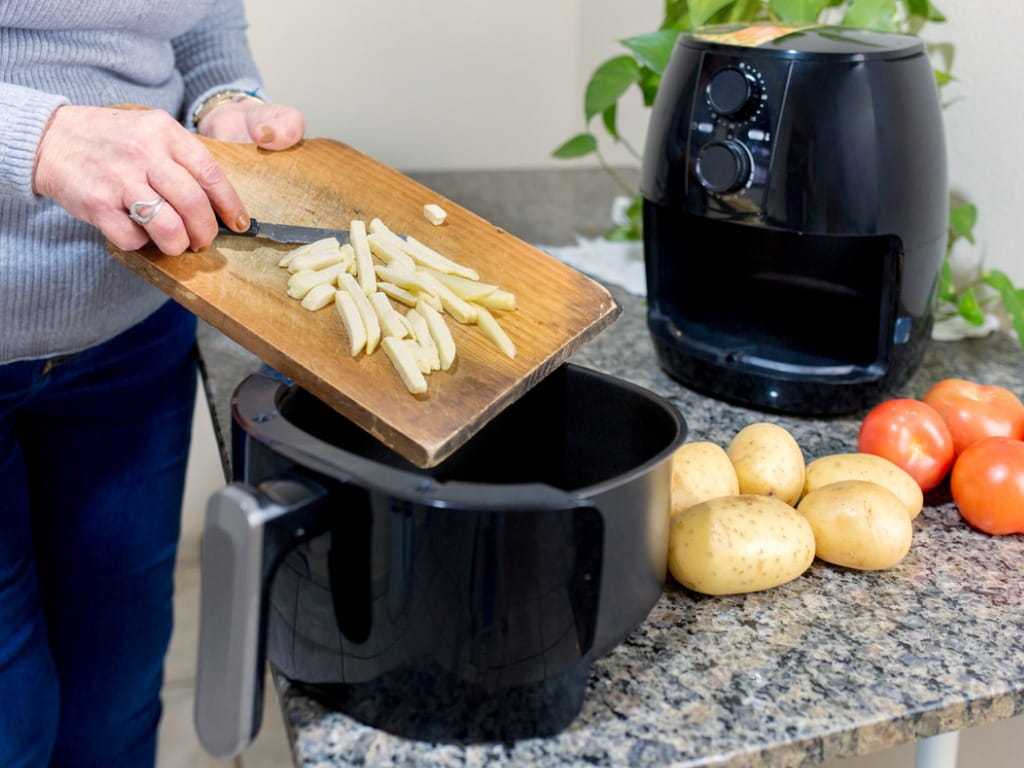People often debate whether air fryers are truly a healthier and more convenient kitchen gadget. Some critics argue that air fryers may not deliver the same taste as traditional frying and question their actual health benefits. Others are concerned about the cost, size, and potential added chemicals from anti-stick coatings. The main reasons people are against air fryers include concerns about their nutritional value, the quality of the food they produce, and skepticism about whether they’re worth the investment.
In short, while air fryers are praised for their convenience and lower fat cooking, many critics worry about whether they truly offer healthier options or if they compromise flavor and food quality. These concerns contribute to the ongoing debate about whether air fryers are a beneficial addition to the kitchen.
Air fryers have surged in popularity due to their promise of crispy fried foods without the excessive use of oil. However, despite their trendy appeal, not everyone is convinced that they’re the perfect solution for healthy eating or culinary excellence. Critics voice concerns that air fryers might not provide the same satisfying taste as traditional frying, and some question if they truly reduce calorie intake or improve nutrition. Others point out issues like the device’s size, clogging potential, and the presence of chemicals from non-stick coatings. As with many modern gadgets, the debate revolves around whether the benefits outweigh the drawbacks, and whether air fryers are just a passing fad or a genuine upgrade to home cooking.
Why are people against air fryers?
Concerns About Health and Nutrition
Many critics question if air fryers are truly healthier than traditional frying methods. Despite using less oil, some worry that the high cooking temperatures may produce harmful compounds. Over time, there are fears that frequent use might affect health negatively.
It is important to understand that while air fryers reduce oil consumption, they do not eliminate all health concerns associated with fried foods. People worry about the potential formation of acrylamide, a chemical that can develop during high-temperature cooking. Concerns grow around whether air fryers genuinely promote better health or just offer a different way of cooking.
Potential Health Risks From Overuse
Some argue that the convenience of air fryers can lead to overuse. Consuming fried foods regularly, even if prepared with less oil, might still contribute to health problems such as obesity or heart disease. Critics remind consumers to maintain a balanced diet rather than rely heavily on air frying.
In addition, the types of foods cooked in air fryers often include processed snacks and pre-packaged foods. These can contain high levels of sodium and unhealthy fats, negating some health benefits. It’s crucial to balance perceived health advantages with overall dietary habits.
Questionable Food Quality and Taste
A common complaint revolves around the food quality and taste in air fryers. Some people feel that air-fried foods don’t match the crispy texture or flavor of traditional deep-fried items. Critics argue that the flavor profile may be bland or lacking richness.
Furthermore, users report uneven cooking or undercooked parts, especially when cooking larger foods or batch items. This inconsistency can result in dissatisfaction and doubts about the device’s effectiveness.
Environmental and Energy Concerns
Environmental worries are another reason some oppose air fryers. While they are marketed as energy-efficient appliances, skeptics argue that their actual energy consumption may be higher than claimed. Especially when used frequently, this can lead to increased electricity use.
Additionally, the production and disposal of air fryers raise sustainability questions. Critics point out that these appliances contain plastic and electronic components that contribute to electronic waste. Some believe that traditional cooking methods may have a lower environmental impact overall.
Energy Consumption and Cost
Air fryers typically use less energy than ovens, but this isn’t always the case. The actual energy savings depend on factors like cooking duration and food quantity. When used for large meals or multiple batches, they can consume comparable or even higher amounts of electricity.
Moreover, the initial purchase cost of an air fryer can be higher than other small kitchen appliances. This expense, combined with ongoing energy costs, makes some consumers question whether they are a worthwhile investment.
Waste and Sustainability Issues
Many air fryer models contain plastic and electronic components that are difficult to recycle. This raises concerns about contributing to the growing electronic waste problem. The short lifespan of some models further compounds this issue.
Some critics recommend opting for traditional cooking tools that have a longer life span and are easier to recycle. They emphasize the importance of choosing sustainable and environmentally friendly cooking options whenever possible.
Cost and Accessibility
Price is a significant barrier for some people. Air fryers can range from affordable to quite expensive, making them less accessible for budget-conscious families. Critics argue that they might not be a practical purchase for everyone.
Availability can also be an issue in certain regions. Limited access to quality models or local stores stocking these appliances can discourage some potential users. This limits widespread adoption and can foster skepticism about their benefits.
High Purchase Price
While many air fryers are now more affordable, premium models can cost a lot. Consumers often question whether the benefits justify the expense, especially when traditional cooking appliances are already available at lower prices.
Some argue that investing in a good quality oven or stovetop might offer more versatility and durability than a standalone air fryer. This thought process can make consumers hesitant to buy into the trend.
Limited Access and Availability
In some areas, air fryers are not readily available or are sold out due to high demand. This lack of access can result in frustration or skepticism about the device’s practicality. People may also doubt whether the benefits are worth the effort to acquire one.
Limited access can also lead to the perception that air fryers are a luxury item, mainly marketed to higher-income households. This perception might discourage lower-income families from considering them as part of their everyday cooking.
Counterarguments and Misconceptions
Many objections to air fryers stem from misconceptions. Some critics believe that air fryers are not significantly healthier than traditional frying. Others think that they may not be effective for all types of foods or cooking styles.
It’s essential to explore these myths to understand the real reasons behind opposition. Education about how air fryers work and their true benefits can help dispel some of these concerns.
Misunderstanding of Health Benefits
Many people assume that because air fryers use less oil, they are completely healthy. However, this isn’t always accurate. Cooking methods still matter, and eating fried foods regularly can pose health risks regardless of the appliance used.
Learning about the actual nutritional differences can help consumers make more informed choices. For instance, air fryers do reduce fat intake but do not eliminate all unhealthy ingredients or cooking byproducts.
Effectiveness for Different Foods
Some skeptics doubt whether air fryers are versatile enough for all cooking needs. Critics argue they may perform well with certain foods like fries or chicken wings but fall short for baking or roasting.
However, many models now offer multiple functions, making them more adaptable. The key is understanding what the appliance can and cannot do based on its design and features.
Misconceptions About Cost and Value
A common misconception is that air fryers are overpriced for their capabilities. Some believe that their cost isn’t justified by the benefits offered. Others compare them unfavorably to traditional appliances.
Educating consumers about the long-term savings in oil and energy costs can help. Highlighting the convenience and time-saving features also shows their true value.
The opposition to air fryers often revolves around concerns about health, environment, cost, and effectiveness. Critics worry about whether they genuinely promote healthier eating or if they are just a trendy gadget. Environmental issues and high prices also influence their perception. Addressing these concerns openly and providing accurate information can help consumers make better decisions. Despite the criticisms, many users continue to enjoy the convenience and taste that air fryers offer — but understanding the reasons behind the opposition helps everyone make more informed choices.
Doctor Explains “Toxic” Air Fryers!
Frequently Asked Questions
Are concerns about the nutritional value of air-fried foods justified?
Some people believe that air fryers may compromise the nutritional quality of foods because they often use processed ingredients or rely on certain cooking methods. However, when used properly, air fryers can help prepare healthier meals by reducing oil intake, which benefits heart health. The key is to choose whole, nutritious ingredients and avoid overly processed foods for the best nutritional outcome.
How does the cost of an air fryer influence people’s opinions against it?
Air fryers can be pricey, especially for high-end models with additional features. This cost can deter some consumers, especially if they do not see a significant difference in cooking results compared to traditional methods. Additionally, some worry about the long-term durability of these appliances, which can lead to skepticism about their value for money.
What safety concerns lead some to oppose air fryer use?
While generally safe, some individuals worry about potential risks such as overheating or fires if the device is not used correctly. Others are concerned about the environmental impact of cooking appliances, including energy consumption and the disposal of electronic waste. Proper usage and maintenance can mitigate most of these safety concerns.
Why do some critics argue that air fryers might not offer significant advantages over conventional frying?
Critics often point out that air fryers may not drastically reduce calorie content or health risks compared to traditional frying, especially if users rely on breaded or heavily processed items. Additionally, some find that air fryers do not produce the same texture or flavor as deep frying, which can impact the overall cooking experience and food quality.
Final Thoughts
People often oppose air fryers due to concerns about their health effects and taste. Some believe air fryers produce less flavorful food compared to traditional frying methods. Others worry about the potential presence of harmful compounds when cooking at high temperatures. Additionally, skeptics argue that the cost and appliance clutter outweigh the benefits.
In conclusion, why are people against air fryers? Many criticize them for health worries, taste issues, and practicality. Despite the convenience, these factors make some hesitant to adopt this modern kitchen gadget.
As an Amazon Associate, We earn from qualifying purchases. When you purchase a product through Amazon links on kitchenadvising.com, we may earn a small commission at no extra cost to you. This helps support the site and keep our content free.


